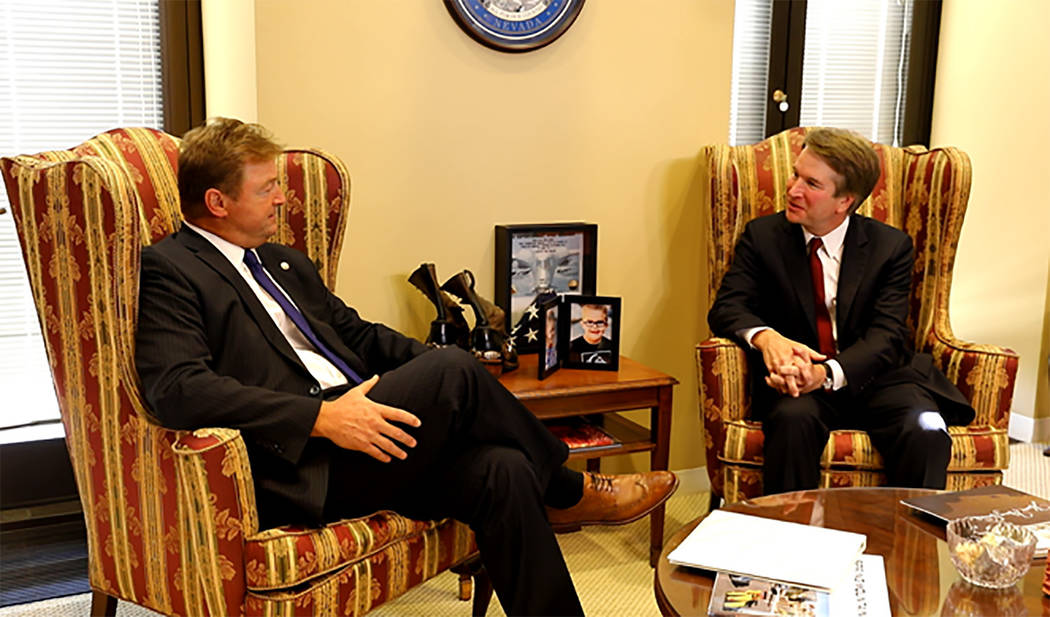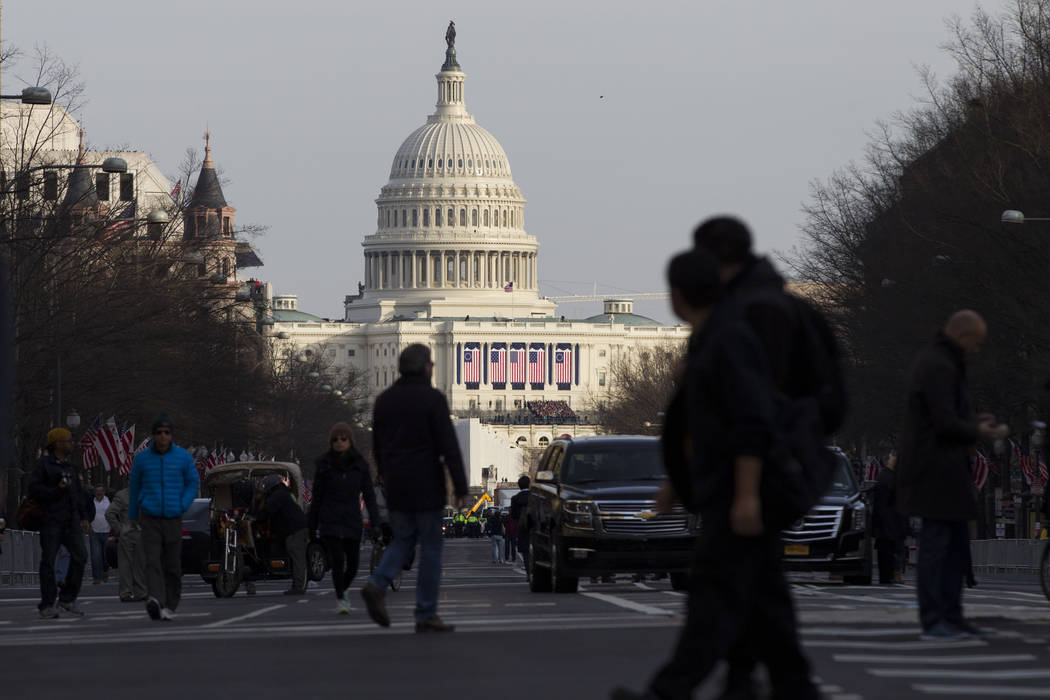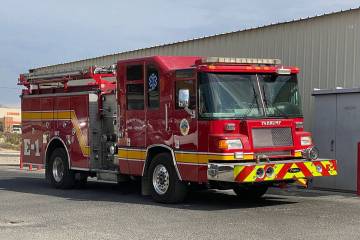Vacancies decrease in federal judiciary
U.S. Sen. Dean Heller, R-Nev., came off the floor of the U.S. Senate in mid-July to talk to reporters in rural Nevada on a conference call about progress being made with filling vacancies in the federal judiciary.
Heller said he had just come from voting to confirm a federal judge at the beginning of the July 18 press call with rural newspapers, including the Pahrump Valley Times.
That judge was Andrew Oldham, who was confirmed to the 5th U.S. Circuit Court of Appeals; the now-federal judge got the green light with a 50-49 vote, on party lines. No Democrats voted for Oldham.
Oldham was the 23rd federal appeals court judge to be confirmed since President Donald Trump came into power less than two years ago — a record-setting pace dating back as far as Jimmy Carter, Senate records dating back to 1977 show.
George H.W. Bush had 22 circuit court judges confirmed in his first two years in office.
The number of confirmations for appeals court judges by Bill Clinton in his first two years in office was 19. Barack Obama had 16 confirmations for his first two years in office for appeals court judges; George W. Bush had 17.
Heller stated the recent confirmations are “good news” as far as he was concerned.
“We’re getting the judiciary wrapped back up, and we’re getting some good judges in there,” Heller said. “They appreciate the rule of law. Let’s put it that way.”
As the confirmations for the federal judiciary grow, the courts are expected to have their ideological orientation pushed to a more conservative tone. The shift is expected to have an effect on rulings in cases involving things such as environmental protection, same-sex marriage, abortion rights and the Affordable Care Act.
According to United States Courts’ website, 142 vacancies existed in the federal appeals and U.S. District Courts as of July 20. As of that date, 13 of those vacancies existed in the Court of Appeals with 129 vacancies existing in the 94 U.S. District Courts across the country.
Organizations such as the Center for American Progress point to the lower federal court’s importance, as few cases are heard in the Supreme Court.
“These courts hear the majority of cases and, most of the time, they have the final say,” a report on the organization’s website stated. That report was written by vice president for the Center for American Progress and Sean Wright, a policy analyst for legal progress at the Center.
Appeals court
The 9th U.S. Circuit Court of Appeals, which hears cases from Nevada and several other western states and some other areas, had a new judge put in place recently. Mark Bennett, who now represents Hawaii for the appeals court, was confirmed by a Senate vote on July 10 in a 72-27 bipartisan vote.
A majority of Senate Republicans (27) voted against Bennet’s confirmation, including Heller.
Another nominee didn’t make it all the way through the process in July. On July 19, Sen. Majority Leader Mitch McConnell withdrew an appellate-court nominee, Ryan Bounds, an assistant U.S. attorney in Oregon, for the 9th U.S. Circuit Court of Appeals, just minutes before there was to be a vote on his confirmation.
The move came when it became apparent there wasn’t enough support to get Bounds confirmed.
Bounds’ Democratic home-state senators, Sens. Jeff Merkley and Ron Wyden, had objected to his nomination to the appeals court. Both Oregon senators pointed to writings Bounds did during his college years, which they said showed “alarming views on race, workers’ rights and the gay community,” according to a report in the Seattle Times.
Not record setting
According to data on the U.S. Courts’ website, 44 federal judges have been confirmed under Trump’s term in office.
Trump is not setting records for his performance in having judges confirmed in all portions of the federal judiciary. Through July 20, 44 judges have been confirmed under Trump. This number is higher than the 37 judges confirmed through July 20, 2010 under Obama, which would have been his second year in office. George W. Bush had 61 federal judges confirmed using the same parameters.
Using those parameters also puts other presidents such as Clinton and former president Ronald Reagan ahead of Trump.
Confirming future judges might not prove as difficult as it was in the past.
The once burdensome process of confirming federal judges for lower courts was removed by Democrats in 2013. That’s when the party did away with using filibusters for confirming judicial nominees to lower courts and used what’s known as the “nuclear option.”
The once-needed 60 votes to break a filibuster was no longer necessary under the option, which only required a simple majority or 51 votes, if a full Senate is present, to confirm federal judges in the lower courts.
Republicans currently hold 51 seats in the Senate, though Sen. John McCain, R-Ariz., is absent, leaving Republicans with only 50 votes, though still higher than the other 49 senators in the chamber.
Democrats hold 47 seats in the Senate with the chamber’s two Independents typically caucusing with the party.
Supreme Court pick
In 2017, using precedents set by the Democrats, Republicans invoked the nuclear option for the highest court in the land to confirm Justice Neil Gorsuch, changing the rules in the Senate. Prior to that, Senate members had used filibusters, which took a vote by at least 60 senators to break it for Supreme Court confirmations.
With the retirement of Justice Anthony Kennedy, Trump has named a second nominee for the Supreme Court. Trump named Brett Kavanaugh to fill the spot.
Heller met with Kavanaugh in mid-July to “learn more about his judicial philosophy, and discuss his approach to service on our nation’s highest court,” Heller said in a statement.
The Nevada senator is throwing his support behind the Supreme Court nominee.
“Judge Kavanaugh has an extensive record that reflects a clear respect for precedent,” Heller said in a statement. “He is a mainstream jurist who has proven that he is dedicated to defending the Constitution and upholding the rule of law – not rewriting it from the bench. His legal career combined with his educational credentials make him an exceptionally qualified nominee to fill the upcoming vacancy on the U.S. Supreme Court. At this point, I have no reservations in confidently supporting Judge Kavanaugh’s confirmation.”
U.S. Sen. Catherine Cortez Masto, D-Nev., is planning to review Kavanaugh’s background, as are other Democrats in the Senate, according to a July 19 report in the Las Vegas Review-Journal. Cortez Masto has not yet scheduled a meeting with Kavanaugh.
Some of the next steps include having hearings in the Senate Judiciary Committee for Kavanaugh’s potential confirmation. Heller expected that to happen in mid-to-late August.
“You’ll see a week or two of hearings, and I think they’re going to be pretty dramatic hearings,” Heller said. “Both sides are really locked in and are ready for this particular argument.”
Heller said it’s a goal by Republican leadership in the Senate to confirm Kavanaugh by the time the Supreme Court comes into session in October. The party is ready to stand strong on its push for confirmation of a Supreme Court nominee.
“It’s up to the other side,” Heller said. “If they want to drag this thing out, we’ll be here all of August. We’ll be here in September. And we’ll be here all of October if that’s what it takes to confirm and have a vote on this nomination.”
Contact reporter Jeffrey Meehan at jmeehan@pvtimes.com


















